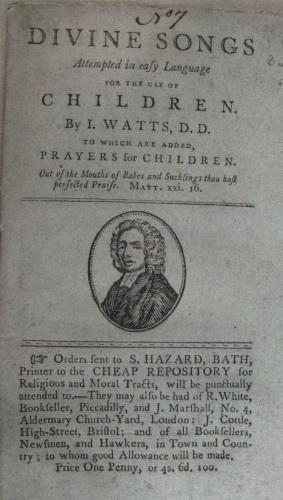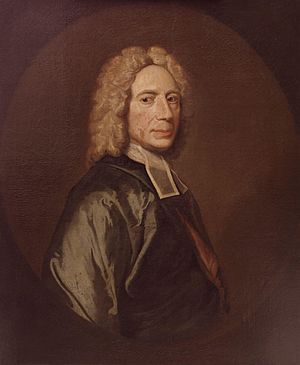Divine Songs Attempted in Easy Language for the Use of Children facts for kids

Cheap Repository Tracts edition, 1795
|
|
| Author | Isaac Watts |
|---|---|
| Country | United Kingdom |
| Language | English |
| Genre | Children's literature |
|
Publication date
|
1715 |
Divine Songs Attempted in Easy Language for the Use of Children is a famous collection of poems for kids. It was written by Isaac Watts and first published way back in 1715. You might also know it as Divine and Moral Songs for Children.
Even though Isaac Watts is now more famous for his hymns (like church songs), Divine Songs was a super popular book for children for almost 200 years! It was even used as a textbook in schools. By the mid-1800s, there were over a thousand different versions of the book.
Contents
Famous Poems in Divine Songs
Some of the most well-known poems from this collection are "Praise for Creation and Providence", "Against Idleness and Mischief", and "The Sluggard".
"I Sing the Mighty Power of God"
"Praise for Creation and Providence" is now a popular hymn often called "I sing the mighty power of God". People of all ages still sing it today. It talks about how amazing God's creation is.
"How Doth the Little Busy Bee"
"Against Idleness and Mischief" and "The Sluggard" were written to teach children how important it is to work hard. They were extremely famous in the 1800s.
"Against Idleness and Mischief" is better known by its first line, "How doth the little busy bee". This poem encourages kids to be like a busy bee, always working and doing good things. It warns that if you're idle (doing nothing), you might get into trouble.
"'Tis the Voice of the Sluggard"
"The Sluggard" is often remembered as "'Tis the voice of the sluggard". A "sluggard" is someone who is lazy and doesn't want to work. This poem describes a lazy person who just wants to sleep all day. It teaches kids not to be lazy.
Divine Songs in Other Books
These poems were so well-known that other famous writers mentioned them in their own books.
Charles Dickens and Idle Hands
The famous writer Charles Dickens sometimes quoted "Against Idleness and Mischief" in his novels. For example, in his book David Copperfield, a school teacher quotes lines from the poem: "Satan finds some mischief still, for idle hands to do." This means that if you have nothing to do, you might end up doing something bad.
Lewis Carroll's Parodies
Lewis Carroll, who wrote Alice in Wonderland, made fun of these poems in his own funny way. He wrote parodies, which are humorous imitations of existing works.
- He parodied "Against Idleness and Mischief" as "How Doth the Little Crocodile".
- He parodied "The Sluggard" as "'Tis the voice of the Lobster".
These parodies show just how famous Watts's poems were at the time!
 | Stephanie Wilson |
 | Charles Bolden |
 | Ronald McNair |
 | Frederick D. Gregory |


